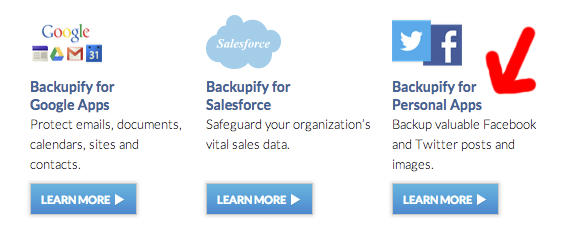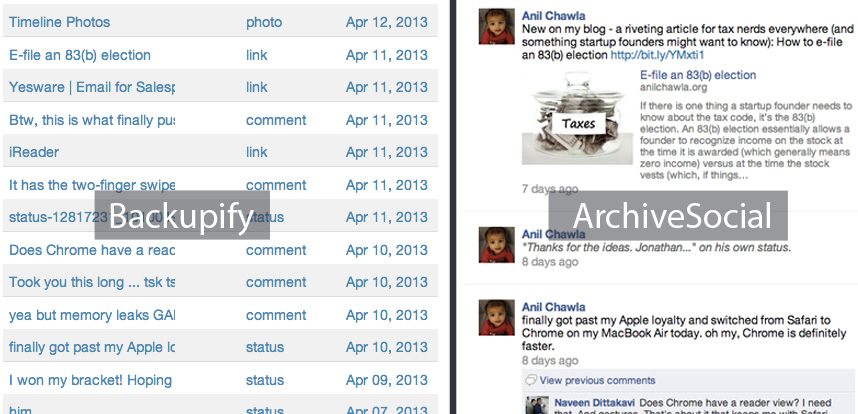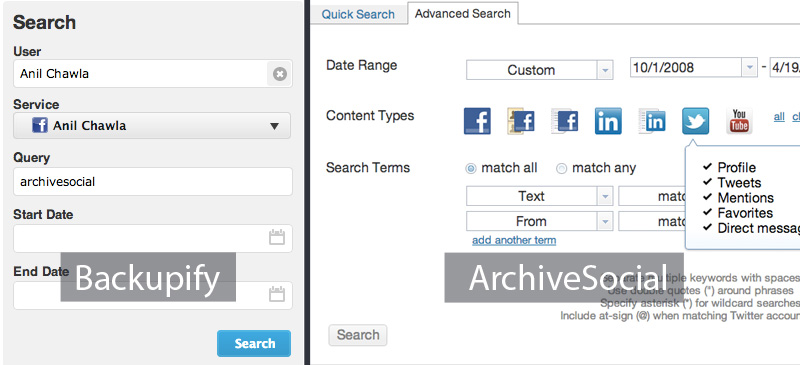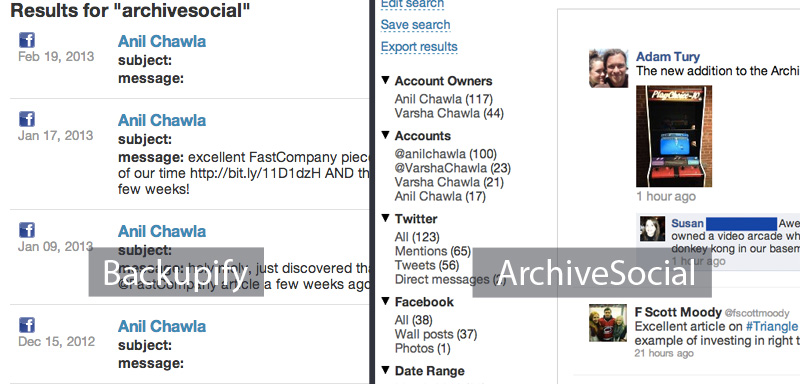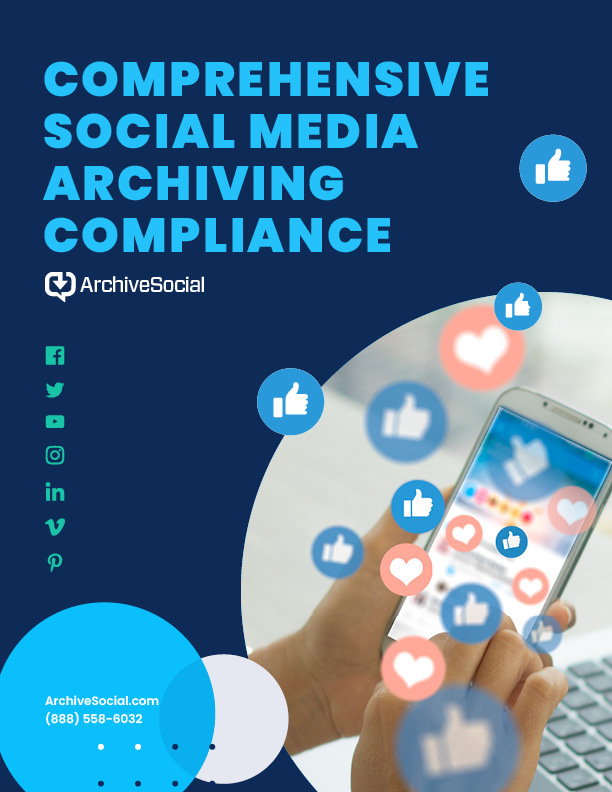Businesses occasionally ask us about Backupify vs ArchiveSocial in the context of social media archiving. Believe it or not, we are fans of Backupify. Backupify launched in 2008 as one of the first tools for consumers to backup their personal social media activity. Their cloud-based service is simple, affordable, and just works automatically; a model we deeply believe in at ArchiveSocial. That said, ArchiveSocial and Backupify are two very different services for two very different purposes. In fact, there are a host of social media backup tools like Backupify (e.g. SocialSafe, FrostBox, BackupMyTweets, etc) that sometimes pop up in a conversation about social media archiving. In this post, I want to share a detailed comparison of how vastly different we are to these types of tools when it comes to record keeping and compliance for a business.
Backupify vs ArchiveSocial? It’s apples vs oranges
Backupify’s social media offering is a backup tool for personal social media accounts. ArchiveSocial is an archiving solution for business social media activity. What’s the difference? Well, for starters, “backup” and “archiving” each serve a different purpose (as Backupify also explains on its blog). In essence, the purpose of backup is to maintain a secondary copy of your data in case the primary copy is lost (i.e. backup exists so that you can restore). The purpose of archiving, on the other hand, is to preserve complete, unalterable records of data in the event that information must be searched and produced in the future — most often for legal and compliance needs. The distinction may seem subtle, but as I walk through each product’s functionality below, you will see that it makes a world of difference in how a product is designed and can be used.
It is also worth mentioning that Backupify’s social media product is for personal usage. This is in contrast to their primary offerings which are business solutions for Google Apps and SalesForce. It is helpful to see that Backupify recently rebranded the social media functionality as “Backupify for Personal Apps”, although it is unclear whether they are continuing to invest in the social media features. ArchiveSocial’s social media functionality, on the other hand, is designed entirely for a business. We provide the ability to manage social media according to your organizational structure, and we’ve taken additional steps to ensure that you’re data is legally sound and compliant with industry regulations. Moving forward, we are continuing to invest in business-oriented functionality such as analytics and reports.
What you see is what you get
Perhaps most striking is the difference between the user interfaces of our two products. It really highlights the distinction between a backup tool and an archiving solution. Below is the presentation of the same Facebook content in Backupify vs ArchiveSocial:
As you can see, Backupify (on the left) provides a very basic table listing of items backed up. There is no indication of the relationship between content and no real context. For example, a wall post and its very own comments are listed separately in the table. Hence, if a comment appears on that wall post several months from now, it will be several months apart in the table listing. Remember, the purpose of backup is to simply have a secondary copy. It might be easy to piece things together when trying out the tool for just a few days, but it can be impossible to re-construct conversations, sift through thousands of records, and make sense of the data many years from now.
ArchiveSocial (on the right) presents the content almost exactly as it appears on the original social network. You can expand comment threads, click on mentions and hashtags, view photos, etc. The intention is to give you as complete context as possible when searching and producing records. The end result is that you can make sense of your records when you need them — a fundamental criteria when evaluating any archiving solution.
Better data means a better archive
A common misconception is that a basic copy of the content is “good enough” for business needs. If you are a financial services firm regulated by SEC or FINRA, a public agency subject to records laws (e.g. FOIA), or any other business concerned about litigation and e-discovery: a simple copy is not good enough. Most regulations require that records cannot be altered or falsified, and courts will often hesitate to accept legal evidence if it is incomplete or not forensically sound. ArchiveSocial addresses these requirements by capturing 100% authentic records and securing the data with digital signatures that prove authenticity.
Furthermore, ask any compliance officer, records manager, archivist, or legal counsel: the more information you can have within (and about) the record, the better. A clear example is how Facebook photos are handled in Backupify vs ArchiveSocial. While Backupify only captures the thumbnail of the photo, ArchiveSocial will also archive the highest resolution of the photo to ensure that details in the photos are visible. Another example is how Twitter content is handled. While Backupify will simply store the tweet as it is, ArchiveSocial will auto-resolve shortened URLs to ensure that the archive contains the full context of the tweet. ArchiveSocial also captures new content continuously throughout the day, rather than once a day like Backupify.
An archive is only as good as its search
The whole point of archiving records in the first place is so that you are able to locate and produce the records when you need them. In other words, before selecting an archive solution, be sure to test the search. Here is how the search compares in Backupify vs ArchiveSocial:
Backupify allows you to perform a simple keyword search based on time range, but it can only search across a single account at a time. ArchiveSocial allows you to search across across all of your social media or a specific subset. You can also compose more advanced searches with multiple keywords, conversation participants, and more. Here is a look at the search results:
Backupify presents the results in a flat table listing, requiring you to click into each result to see them. There are no other options. ArchiveSocial, on the other hand, provides a sophisticated interface for viewing the content in full context. You can instantly drill-down to specific subsets of the search results by applying and removing category filters. And finally, you can export the search results — filtered and sorted exactly the way you want them — to a variety of output formats.
Using your records must be easy too
To re-iterate one last time, archiving is all about being able to produce records when you need them. Financial services firms must plan for providing a variety of information during an audit. Government agencies must evaluate the effort required to fulfill each and every public record request. And businesses in general must consider the ability to leverage their records in legal situations. In conjunction with the search functionality, the output formats provided by the archiving solution are of critical importance.
Backupify provides one option: download the data in its original technical format. This makes sense because it is a backup tool and it simply keeps a copy. In contrast, the records in ArchiveSocial are intended to be used in a variety of business situations. ArchiveSocial is able to export search results and other records into many formats including PDF, HTML, and Excel — automatically from our user interface with absolutely no manual effort.
ArchiveSocial vs Backupify: Conclusion
Ultimately, it is all about choosing the right tool for the job. Backupify is an extremely cheap and simple solution for an individual wanting to keep a copy of their own social media (I would also suggesting looking at Cue). When it comes to archiving business-grade records for legal and compliance, however, the requirements and use cases require a different approach. And that, put simply, is why we created ArchiveSocial.
Please note: Backupify is a registered trademark of Backupify, Inc. and is not affiliated with ArchiveSocial.

